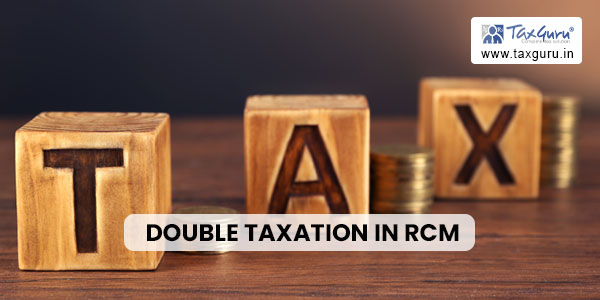The Reverse Charge Mechanism (RCM) has been introduced to simplify tax collections, particularly from unorganized sectors. However, this mechanism has raised significant issues of double taxation, putting the recipient of goods and services in a financial dilemma. This occurs when both the supplier and the recipient end up paying the Goods and Services Tax (GST) on the same transaction. Court decisions, such as those by Kolkata CESTAT and CESTAT Delhi, have tackled this issue. This article delves deep into the complexities of RCM-related double taxation and elaborates on the legal perspectives provided by these decisions.
The Reverse Charge Mechanism (RCM) is a mechanism under which the recipient of goods and/or services becomes liable to pay the tax instead of the supplier. In other words, the supplier is relieved of his tax liability and the recipient is made liable to pay the tax. The objective of RCM is to widen the scope of levy of tax on unorganized sectors and give exemption to specific class of supplier of goods/services and import of services. Also, the intention of any taxation law is to collect tax once on the taxable transaction. Where legislature feels to protect leakage, instead of forward charge, RCM system is applied. In this system, if the dealer has paid tax on time, then his ITC would be available at the same time and if dealer do not pay the same, the dealer would not be entitled for the ITC.

Double collection of GST under Section 9(4) of the CGST Act, 2017 occurs when both the supplier and the recipient pay GST on the same transaction. This happens when the supplier has charged GST on the supply and the recipient also pays GST under the RCM. Double taxation is a serious issue, and it can cause financial hardship to the recipient of goods and services. Therefore, if the tax is paid under RCM, though right or wrong, the tax authorities cannot be justified in asking tax on forward basis on the same transaction from the supplier.
Kolkata CESTAT in the case of Mahanadi Coalfields Ltd Vs CCGST & CX (Service Tax Appeal No. 77172 of 2019 decided on 04.09.2020) held there is no reason to confirm the demand when service tax stands already paid and there is no loss of revenue to the Exchequer.
CESTAT Delhi in the matter of Chemix Oil Pvt Ltd Vs Commissioner of CE & ST (CESTAT Chandigarh) (Service Tax Appeal No. 60397/2022 decided on 10.04.2023) held that service provider collected service tax on the 100% value and deposited the same to the government exchequer. Now demanding service tax from the appellant would amount to double taxation on the service. This issue has also been considered by the Tribunal in the case of Mahanadi Coalfield Ltd. (supra) and Mandev Tubes vs. CCE, Vapi, 2009 (16) STR 724 (Tri.-Ahmd.) wherein it has been held that even if the tax is liable to be paid under RCM but the same is paid by the service provider, it was not open to the department to demand the same again from the assessee. Hence, demanding service tax from the appellant under reverse charge mechanism is not sustainable in law.
Conclusion
Double taxation under the RCM is not just a matter of legal confusion but also an ethical dilemma for tax authorities. The objective of any tax law should be to levy the tax once for a single transaction. Various court decisions have fortified this principle, stating that if the service provider has already discharged the tax liability, any further demand from the recipient under RCM would amount to double taxation and is not sustainable in law.
The judiciary has set a clear path for navigating the complexities of RCM, providing relief and clarity to businesses grappling with the financial and legal implications of double taxation.
*****
Disclaimer: Nothing contained in this document is to be construed as a legal opinion or view of either of the author whatsoever and the content is to be used strictly for informational and educational purposes. While due care has been taken in preparing this article, certain mistakes and omissions may creep in. the author does not accept any liability for any loss or damage of any kind arising out of any inaccurate or incomplete information in this document nor for any actions taken in reliance thereon.





